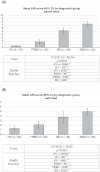The Affective Reactivity Index: a concise irritability scale for clinical and research settings
- PMID: 22574736
- PMCID: PMC3484687
- DOI: 10.1111/j.1469-7610.2012.02561.x
The Affective Reactivity Index: a concise irritability scale for clinical and research settings
Abstract
Background: Irritable mood has recently become a matter of intense scientific interest. Here, we present data from two samples, one from the United States and the other from the United Kingdom, demonstrating the clinical and research utility of the parent- and self-report forms of the Affective Reactivity Index (ARI), a concise dimensional measure of irritability.
Methods: The US sample (n = 218) consisted of children and adolescents recruited at the National Institute of Mental Health meeting criteria for bipolar disorder (BD, n = 39), severe mood dysregulation (SMD, n = 67), children at family risk for BD (n = 35), or were healthy volunteers (n = 77). The UK sample (n = 88) was comprised of children from a generic mental health setting and healthy volunteers from primary and secondary schools.
Results: Parent- and self-report scales of the ARI showed excellent internal consistencies and formed a single factor in the two samples. In the US sample, the ARI showed a gradation with irritability significantly increasing from healthy volunteers through to SMD. Irritability was significantly higher in SMD than in BD by parent-report, but this did not reach significance by self-report. In the UK sample, parent-rated irritability was differentially related to emotional problems.
Conclusions: Irritability can be measured using a concise instrument both in a highly specialized US, as well as a general UK child mental health setting.
© 2012 The Authors. Journal of Child Psychology and Psychiatry © 2012 Association for Child and Adolescent Mental Health.
Figures

References
-
- Aebi M, Asherson P, Banaschewski T, Buitelaar J, Ebstein R, Eisenberg J, Gill M, Manor I, Miranda A, Oades RD, Rothenberger A, J S, Sonuga-Barke E, Thompson M, Taylor E, Faraone SV, Steinhausen HC. Predictability of oppositional defiant disorder and symptom dimensions in children and adolescents with ADHD combined type. Psychological Medicine. 2010;40:2089–2100. - PubMed
-
- Angold A. Diagnostic Interviews with parents and children. In: Rutter M, Taylor E, editors. Child and adolescent psychiatry. Oxford: Blackwell Publishing; 2002. p. 32.
-
- APA. Diagnostic and statistical manual of mental disorders: DSM-IV-TR. Washington, DC: American Psychiatric Press; 2000.
-
- APA. Oppositional defiant disorder. DSM-5 development. American Psychiatric Association; 2011a. Available from: http://www.dsm5.org/ProposedRevisions/Pages/proposedrevision.aspx?rid=106 [last accessed 28 April 2012]
-
- APA. Temper dysregulation disorder with dysphoria. DSM-5 development. American Psychiatric Association; 2011b. Available from: http://www.dsm5.org/proposedrevisions/pages/proposedrevision.aspx?rid=397 [last accessed 28 April 2012]
Publication types
MeSH terms
Grants and funding
LinkOut - more resources
Full Text Sources
Medical

